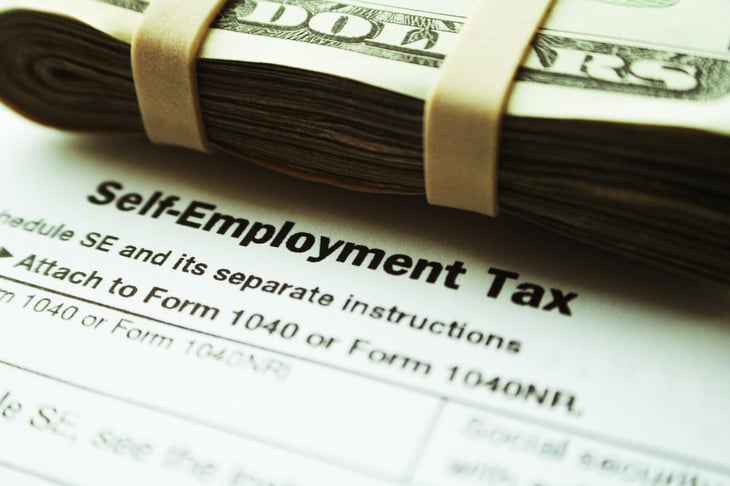
DisobeyArt / Shutterstock.com
If you happen to made additional earnings final 12 months by promoting an amazing piece of artwork or strolling your neighbor’s canine, you then’re one of many greater than 58 million gig staff, freelancers, and different self-employed individuals in america.
Simply since you is probably not an worker of an organization doesn’t imply that you’re exempt from paying taxes. The IRS expects you to pay taxes in your self-employment earnings simply because it expects conventional staff to pay taxes on the earnings they obtain from their employers.
However paying tax on self-employment earnings is usually a lot extra sophisticated than paying tax on conventional earnings from an employer.
Here is what anybody who earns a gig, freelance, or different self-employed earnings — whether or not part-time or full-time — must learn about federal earnings taxes.
1. Your earnings is taxable
 Pe3k / Shutterstock.com
Pe3k / Shutterstock.com
Once more, self-employment earnings of any variety is usually taxable and should be reported in your federal tax return. That is true even when you’ve got not obtained statements of earnings akin to the next from the businesses by which you obtained gig, freelance, or different self-employment earnings:
- Type 1099-MISC (for different earnings)
- Type 1099-NEC (for non-employee compensation)
- Type 1099-Ok (for third-party cost card and community transactions, which can embrace earnings from gig work platforms akin to Airbnb and Uber)
Because of a current change made by the IRS, chances are you’ll not have obtained a 2022 Type 1099-Ok for relevant earnings. Nevertheless, the IRS nonetheless expects you to report that earnings.
In case your internet self-employment earnings was $400 or extra in 2022, you should report that earnings on a Schedule C, which is the title of a particular type that you just connect and file along with your tax return.
2. You might be accountable for withholding
 Shutterstock Skilled/Shutterstock.com
Shutterstock Skilled/Shutterstock.com
Gig staff and freelancers are thought-about self-employed, and all self-employed individuals are accountable for paying their very own taxes — in contrast to when you work for an organization, which withholds earnings, Social Safety, and Medicare taxes out of your paychecks. So you should make quarterly tax funds by submitting a Type 1040-ES, Estimated Tax for Naturals, with the IRS.
For the reason that self-employed are required to pay tax quarterly slightly than yearly, underpayment of quarterly tax may end up in an underpayment penalty at tax time. In keeping with IRS:
“Generally, most taxpayers keep away from this penalty in the event that they owe lower than $1,000 in tax after their withholdings and credit have been deducted, or if they’ve paid not less than 90% of the tax for the present 12 months, or 100% of the tax reported on the return.” for the earlier 12 months, whichever is smaller.”
3. Preserving detailed information is essential
 WAYHOME Studio / Shutterstock.com
WAYHOME Studio / Shutterstock.com
While you’re self-employed, you do not simply want to trace your earnings. Additionally, maintain a log of all of your bills associated to your gig, freelance, or different self-employed exercise, together with holding copies of all receipts. As a result of while you submit your annual tax return, you may deduct the chargeable bills of self-employment and thus scale back your taxable earnings.
Self-employment expense deductions are like different federal tax deductions in that their value equals your tax charge. For instance, in case your state earnings tax charge is 22%, each dollar you may deduct in your Schedule C saves you 22 cents in taxes. It pays to maintain all receipts!
Undecided what else to doc? Go to the IRS Self-Employed and Small Business Information Web page.
Undecided what to deduct? See Half II of Schedule C directions or contemplate consulting a tax advisor. After all, hiring knowledgeable will price you one thing, however it could actually additionally make it easier to keep away from an audit, which we’ll get to subsequent.
4. You usually tend to be audited
 igorstevanovic / Shutterstock.com
igorstevanovic / Shutterstock.com
Taxpayers who file a Schedule C usually tend to be audited. On this case, the IRS requires proof of all of your bills deducted. That is one more reason to be sure to maintain detailed information.
Additionally, ensure that the bills you deduct are literally enterprise bills and never private bills, because the IRS opinions Schedule C bills from that perspective. The Authority’s handbook for Schedule C correspondence examinations – that are basically postal examinations of Schedule C candidates – states:
“As a result of taxpayers will not be accountable to anybody as sole proprietors, they’ve alternatives to combine private and enterprise pursuits in conducting their commerce or enterprise. It’s the auditor’s duty to acknowledge circumstances through which private bills are deducted as enterprise bills and to right the taxpayer’s tax return accordingly.”
5. You might have a alternative about the price of the automobile
 Prostock Studio / Shutterstock.com
Prostock Studio / Shutterstock.com
If you happen to use your automobile for enterprise, you in all probability have to decide on between two choices for deducting your automobile bills.
- Regular mileage allowance: In case you are eligible for this selection and select the usual mileage charge, you may deduct qualifying miles at a charge of 58.5 cents per mile pushed from January by June 2022 and 62.5 cents per mile pushed from July by December 2022. You can not declare another automobile prices.
- Precise bills: If you happen to select this selection, “you should decide what it truly prices to function the automobile for that portion of the automobile’s complete use that’s used for enterprise,” in accordance with the IRS. This may occasionally embrace “gasoline, oil, repairs, tires, insurance coverage, registration charges, licenses, and depreciation (or lease funds) attributable to the portion of complete miles pushed which are enterprise miles.”
Parking charges and tolls that you just incur professionally could be deducted individually. Meaning you may deduct them no matter whether or not you deduct different vehicle-related bills by way of the usual mileage charge or precise bills.
6. Study every little thing else that’s deductible
 Anatoliy Karlyuk / Shutterstock.com
Anatoliy Karlyuk / Shutterstock.com
Even when you do not use your automobile for enterprise functions, you is perhaps stunned at what number of bills you may deduct relying on the character of your job, freelance work, or different self-employment.
For instance, are you taking a category or two to enhance your advertising and marketing abilities for what you are promoting? You’ll be able to deduct this as an expense. If in case you have ordered enterprise playing cards and different advertising and marketing supplies, you may deduct these as nicely. If that is your first time with a Schedule C, go to the IRS’s Gig Economic system Tax Heart to study extra.